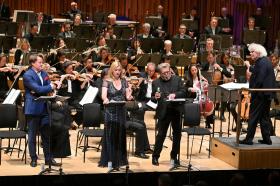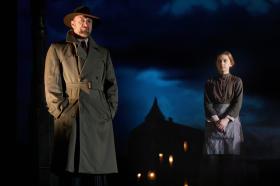In recent years increasing numbers of actor/audience conflicts and difficulties have led writers, actors, social commentators and web loggers to debate the current standards of audience behaviour.
As one stunned theatre goer noted recently, “OK now I’ve seen it all!! I was at Anything Goes on a Saturday… A man in row H of the stalls had a tiny portable television, it was ON – (he did have headphones!!) and he was watching the rugby!!!!”
Incidents such as these have led to speculation that a growing number of audience members are no longer savvy with regard to theatre-going etiquette. And the advent of the omni-present mobile phone has not helped things at all. More generous critics have pointed towards the need to re-school audiences in what is expected of them. With this in mind many theatre websites now include a brief overview of audience rules of engagement.
On stage in London recently actor Richard Griffiths lost his temper with an audience member during a performance of Heroes. Apparently their mobile phone had gone off during the play for the sixth time. Totally fed up, the veteran actor said; “Could the person whose mobile phone it is please leave?” And they did.
Indian actor and director Swapna Sandhani recounts a similar experience in 2004: “I had stopped my show, Kolkatar Elektra, at Odeon 2004 when a mobile rang and asked the owner of the phone to leave the auditorium. Other members of the audience also supported me. This is the only way this nuisance can be stopped. I do not know why we, theatre performers, do not protest.”
The ubiquity of the mobile phone now seriously compromises public and private space – rendering them virtually equivalent. Our lives have become dominated by strident ring tones and the ever-mounting pressure to answer calls (on the toilet, walking the baby, in the theatre). Is this the final frontier of the erosion of privacy? It is as if mobiles are the new smoking, with ‘users’ flaunting an ‘I want to talk so everyone has to listen’ disregard. As Lloyd Dykk commented recently quipped in an article: “Between cell phones, talking and inappropriate clapping, plummeting standards of audience behaviour are making concerts harder to enjoy.”
Are we actually losing our collective sense of what is appropriate, or is something else going on? Dykk is not sure: “A cell phone went off at the symphony during a program of Brahms’ Third Symphony… This time the culprit put Brahms on hold, and the whole theatre with him, and answered the phone. Actually answered the phone…”
This experience, and countless others like it, seem to suggest that modern audiences, for the most part reared on a solid diet of media and television, have stumbled into an increasing confusion about how to conduct themselves when confronted by live actors and a shared environment. Asolo repertory theatre’s guide to audience etiquette provides detailed information about the theatrical experience. The site covers issues such as: the difference between television and live art; the actor and audience dynamic; the audience’s responsibility to listen, respect, and enter the play’s world with an open mind.
Lynne Conner, Assistant Professor in the Department of Theatre Arts at the University of Pittsburgh, contends that the audience became passive when the the actors were lit and the auditorium went dark. This marked the end of the debate or ‘open argument’ of theatre. “By the end of the nineteenth century,” says Conner, ”a…well-behaved audience was associated with the middle and upper classes attending “elite” forms of performance, like the symphony or the opera.” This she argues has led to the great cultural divide which we are now experiencing.
Which of course begs the question, what was audience behaviour actually like in the past? In Shakespeare’s time? The BBC’s education site acknowledges that the very characteristics extolled in “well-behaved” audiences can also make for the “dull and unresponsive” audience. Participation is a double-edged sword.
Shakespeare’s audience was loud and boisterous – much more so than patrons of today’s theatres. “You will see such heaving and shoving, such itching and shouldering to sit by the women, such care for their garments that they be not trod on . . . such toying, such smiling, such winking, such manning them home … that it is a right comedy to mark their behaviour” (Stephen Gosson, The School of Abuse, 1579).
Elizabethan audiences applauded, “…but they booed and hissed …and hurled things at the actors.” In fact the “actor’s power was often measured…by his ability to command the attention of the audience,” amid the eating oranges, cracking nuts and drinking noisily! It is estimated that as much as 25 per cent of the population attended the playhouses – a much higher figure than today.
In an effort to stem the virus-like spread of cell-phone misbehaviour, film director Sydney Pollack teamed up last week with Cingular Wireless to create a trailer promoting, of all things – silence! The scene opens with a man in the midst of conducting a personal phone call. Pollack then appears with script in hand, providing stage directions to the caller, who is clearly annoyed that the filmmaker has disturbed him. “Oh, I’m sorry… is my directing interfering with your phone call?” asks Pollack, with more than a hint of sarcasm. “How rude of me!”
In an article for Centre Stage, actor and writer Joseph Bowen made a simple plea for empathy and respect: “Here’s what I suggest. Next time you go to the theatre, take a second to…look at the people around you. They’re nice people. Imagine if they were friends of yours. You’d want to make sure you didn’t do anything to offend them. Then the show starts. The actors walk on stage. They look good in their costumes, they have good speaking voices, they’re probably nice people as well, but the difference here is that they are there to entertain you, because you paid them to do so. When the performance ends, applaud for them to show them you appreciate the work they did for you. After the lights come back up, quietly leave the theatre and maybe even think about what you just saw. Maybe talk about it with the person you just shared this experience with…Then get on your cell phone if you feel you need to.”
The philosopher Suzanne Langer in her writing on theatre has stated that the only qualification required for participation in the arts is “responsiveness.” Perhaps the hope then lies is re-evaluating virtues such as patience, a sense of wonder and the capacity to reflect. In a world where just about anything goes and where you don’t even have to wait for anything much – there is a lot to be gained by developing these arcane human capabilities.




